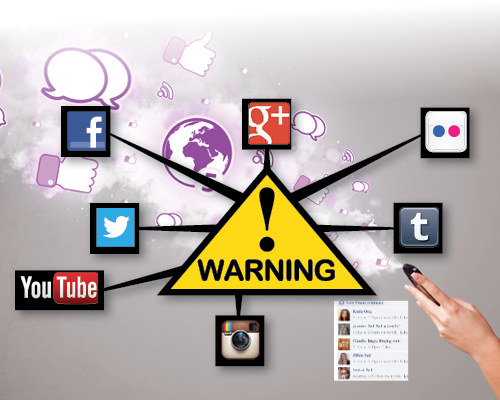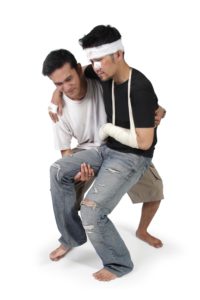 Nowadays, everyone is using social media. It’s great for updating your own information and checking out someone else… just about anyone you want to find information about. It’s also true anyone can search for information about YOU. And that’s just why it’s so important to protect yourself – especially if you have a personal injury case.
Nowadays, everyone is using social media. It’s great for updating your own information and checking out someone else… just about anyone you want to find information about. It’s also true anyone can search for information about YOU. And that’s just why it’s so important to protect yourself – especially if you have a personal injury case.
Don’t you think the insurance adjuster is going to Google you, check out your Facebook profile, and follow you on Twitter for anything possible to make you look bad, embarrass you or use against you to diminish the value of your case?
If you’re going to have your deposition taken, don’t you think the insurance defense attorney has checked you out in every possible way on the Internet, maybe through an investigator and even with video surveillance? When insurance attorneys are preparing deposition or trial questions for you, they’re likely to know everything about you posted on the Internet or found in public records.
After an injury, the best advice is Do Not Post on the Internet, especially on social media sites, until your case is concluded. While you probably won’t take down your social media sites altogether, if there’s no new information posted after your injury, there’s less to be used against you.
A personal injury insurance adjuster’s job is to pay as little as possible for your injury claim. If you provide comments or describe activities on your social media profile, inconsistent with the severity of your claimed injuries, it can be used to attack your credibility and devalue your claim.
Even if you have the most stringent privacy settings enabled, the defendant’s attorney and insurance company can access your information though the civil discovery process, or by a subpoena.
Who, Me? Consider These Examples…
- If you injured your back in a car accident and are claiming you can’t perform heavy lifting, you’re constantly in pain and can’t engage in normal recreational activities, it wouldn’t be a good idea to post a video of you catching and holding a 100-pound tuna on a fishing trip in Mexico. The insurance adjuster on your personal injury claim will use this information against you to make you look like you’re lying or at least exaggerating your injuries.
- Consider, for example, the difference between posting, “Dancing last night was great!” and “I had fun watching you guys dance.” If you went “skiing” with friends, but sat in the lodge and never actually skied, make that clear. If you went bowling, but sat out the last game because your back injury flared up, say so!
- If your Facebook page mentions your love for street racing, and you’ve been injured in an auto accident, where you and the other driver blame each other for speeding and running a red light, don’t you think your online information will lessen the value of your claim?
Remember, the insurance adjuster and opposing attorney on your case will be searching for details regarding you and your claimed injuries. Ideally, it would be best to close down your social media sites during your case. This will ensure you and your friends don’t post any damaging information that will be used against you.
If you insist on using social media, here are a few simple rules you should follow.
- Check your privacy settings and make your personal information and posts private.
- Keep your case private. Don’t post any photos of your accident or give any information regarding recovering from your injuries, or activities which may be construed to be inconsistent with your claimed injuries. Ask your friends not to post about your injuries and activities. If you send a message, know who you’re sending it to.
- For Facebook users, you can remove yourself from showing up in Google’s search results, too. Go to your privacy settings page and uncheck the box under Public Search Listing.
This is a must. - When uploading photos, be selective. Ask yourself, “Will this help or hurt my case?” Set up filters allowing only friends to see your photo albums. For Facebook users, select “Only Me” for people who can view your tagged photos.
- Only accept friend requests from people you know personally. An insurance adjuster may send you a friend request hoping to gain access to your personal information.
- Don’t join groups with names or discussions which could compromise your claim.
- If possible, block all but certain people from viewing your profile. In Facebook, you can do this under the Settings. Additionally, you may want to remove yourself from the Facebook search results. You can do this by selecting “Only Friends” under search visibility.





























